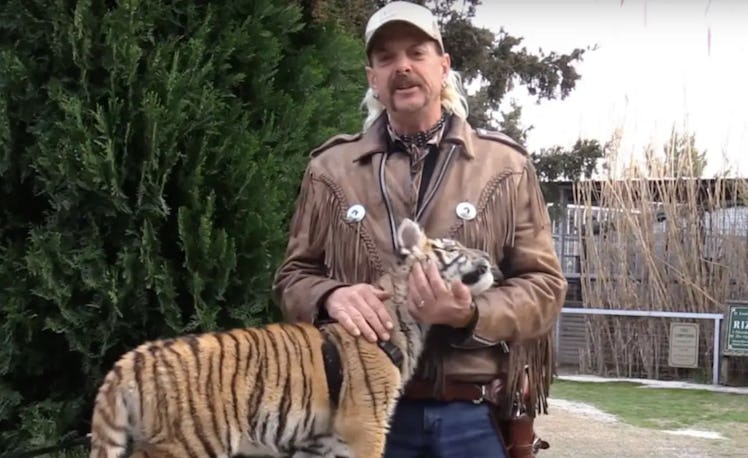As more Zoom calls turn into safari-themed meetings and Carole Baskin memes continue to take over the internet, interest in Tiger King has yet to subside. But while the main human characters of Netflix's hit docuseries have been able to share updates about their lives, the real stars of the show are not able to do so. So, what happened to Joe Exotic's animals after Tiger King? The big cats and other creatures have stories to tell, too.
Fans of the Netflix series had a lot to digest after devouring the story of Joseph Maldonado-Passage (better known as Joe Exotic) and his G.W. Zoo. After being convicted in 2019 for a murder-for-hire plot, falsifying wildlife records, and violating the Endangered Species Act (including allegedly killing five tigers), in January 2020, Exotic was sentenced to 22 years in jail.
Exotic's G.W. Zoo — renamed to the Greater Wynnewood Animal Park — is now in the hands of his former colleague, Jeff Lowe. This means Lowe is currently in control of most of the animals once owned by Joe — but not all of them. Some animals had been moved from the location while Exotic was still running the show at the zoo, and. as shown in the docuseries, before he fled from the park, Exotic also took an undisclosed number of animals with him.
What became of the animals he took with him when he left the park for good is a bit unclear. However, he did reveal the fate of at least some of those creatures: At the end of the series, Exotic mentioned sending his chimpanzees to a sanctuary in Florida, and said he finally understood the wrong he had done after seeing them hug, for once not separated by cages.
Though the name of the sanctuary where the chimps has not been released, there is another new home for some of Exotic's animals that has been made public. Back in 2017, The Wild Animal Sanctuary (TWAS) in Keenesburg, Colorado, reportedly took in 42 of G.W. Zoo's former animals, including 39 tigers and three black bears.
According to People, a judge threatened to charge Exotic with contempt of court for taking 19 big cats across state lines, so the zookeeper surrendered them to TWAS. Shortly after, he gave up 20 additional tigers and three black bears to the organization.
The non-profit is the "largest and oldest dedicated to rescuing large carnivores. [That’s] both in [number] of animals and easily in terms of land available for large-acreage, natural habitats,” TWAS public relations director Kent Drotar told the Denver Post. The sanctuary does not breed animals, nor does it allow guests or keepers to have hands-on contact with the animals — quite a different life for the animals than their former home.
Drotar told People that while some of the animals arrived to the facility malnourished and with mobility issues, they're doing better now. “They are no longer just pacing. It was almost an immediate change with their demeanor," he said. “There is no comparison on where these animals came from and where they are now."
